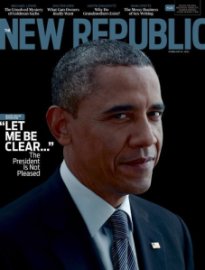The downward spiral of Aaron Kushner and the Orange County Register continues, reports Christine Haughney of The New York Times. The latest — a round-up of what has appeared elsewhere — includes unpaid bills, lawsuits, Kushner’s stepping aside as publisher (“I was not removed,” he insists) and, of course, Kushner’s soothing reassurances that everything is on track.
Tag: Christine Haughney
TNR’s new owner crosses a line with Obama interview
 The New York Times goes deep on The New Republic’s latest reinvention. I wrote a couple of pieces for the venerable magazine many years ago, and I wish it well. But I also wish Times reporter Christine Haughney had explored a conflict of interest in TNR’s relaunch: the participation of new owner Chris Hughes in a major interview with President Obama.
The New York Times goes deep on The New Republic’s latest reinvention. I wrote a couple of pieces for the venerable magazine many years ago, and I wish it well. But I also wish Times reporter Christine Haughney had explored a conflict of interest in TNR’s relaunch: the participation of new owner Chris Hughes in a major interview with President Obama.
I don’t necessarily begrudge Hughes’ wanting to play a role on the editorial side of TNR. It’s now his magazine, and previous owner Marty Peretz was a legendary interferer — sometimes for better, usually for worse. TNR is a small place, and it’s unrealistic to expect the publisher to exercise the same sort of restraint as, say, the publisher of a major daily newspaper.
But Hughes, the 29-year-old co-founder of Facebook, is also the “former online campaign adviser” to the president, as Haughney puts it — and by all accounts the key person in building Obama’s 2008 online presence. In April 2009, Fast Company ran a long profile headlined “How Chris Hughes Helped Launch Facebook and the Barack Obama Campaign.”
The TNR interview with Obama was conducted jointly by Hughes and the magazine’s editor, Franklin Foer. So what kind of hard-hitting questions did Hughes ask? Here they are:
Can you tell us a little bit about how you’ve gone about intellectually preparing for your second term as president?
Have you looked back in history, particularly at the second terms of other presidents, for inspiration?
You spoke last summer about your election potentially breaking the fever of the Republicans. The hope being that, once you were reelected, they would seek to do more than just block your presidency. Do you feel that you’ve made headway on that?
You inspired a lot of people in your first presidential campaign, and with your books, by talking about a new kind of politics. And now, four years later, it’s a time in Washington that’s characterized by nastiness more often that not. How do you reconcile those two things four years in?
It seems as if you’re relying more on executive orders to get around these problems. You’ve done it for gun control, for immigration. Has your view on executive authority changed now that you’ve been president for four years?
The last question is about Syria. I wonder if you can speak about how you personally, morally, wrestle with the ongoing violence there.
A not-uninteresting group of questions. To be fair, I’ve included all of them so that you could see the meaty as well as the fawning. And Hughes and Foer elicit substantive answers from the president. Nevertheless, given Hughes’ background, I found myself asking if he might have been tougher if he were interviewing a president he hadn’t worked for.
This is no more than a minor misstep. The real challenge facing TNR is that it is trying to carve out a niche in a world that has utterly changed since it was — at least in the movie “Shattered Glass” — “the in-flight magazine of Air Force One.” The Internet has made all but a tiny handful of political opinion magazines irrelevant.
Getting TNR back into the game will be a daunting task. Hughes just made it slightly more daunting. I hope he comes to realize that himself.